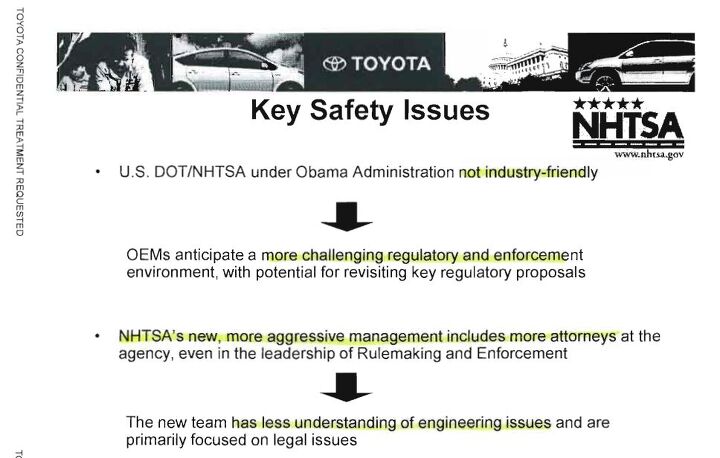Leaked Toyota Documents Ensure Feisty Congressional Hearings
Ah, political spectacle. When Detroit’s CEOs took the stand at congressional hearings over a year ago, the main browbeating bullet point wasn’t the decades of mismanagement and greed, but the fact that Messrs. Wagoner, Mullaly and Nardelli had taken separate corporate jets to the festivities. The lesson: convenient focal points for anger always trump the complexity of a substantive dressing-down. And as congress gears up to grill Toyota’s CEO, the Japanese automaker has given congress just the thing to sharpen its collective knife against: an honest opinion. One document [via Politico PDF here] briefing Toyota USA boss Yoshi Inaba for the hearings, reveals that Toyota believe the current administration is “activist” and that “not industry-friendly.” True or false, this document sets up an adversarial relationship between Toyota and the majority party going into the hearings. Which would be bad enough if Toyota hadn’t also handed over evidence, already leaked by the Oversight committee, indicating that it balances recall costs against risks and lobbies the government in its own interest. On its own, this evidence might be merely embarrassing, but having slighted the Democrats, news that Toyota treats recalls like a business has become prima facie evidence in the (increasingly political) case against the Japanese automaker.
This subpoenaed document is clearly an embarrassment. An internal presentation apparently prepared by Toyota’s Washington DC staff, describes the firm’s 2007 floormat recall as a “Win for Toyota,” noting [via BusinessWeek] that it had
Negotiated ‘equipment’ recall on Camry/ES re:[sudden acceleration], saved $100M+, w/no defect found.
Of course, this ties in nicely with earlier reports of Toyota’s employment of former federal regulators to negotiate such recalls with NHTSA. The implication of course, is that Toyota pressured NHTSA to let it get away with a 55,000-unit floormat recall (thus saving $100m+) when in fact sticky pedals, or some other unexplained problem caused unintended acceleration. Adding to the perception of Toyota as mass manipulator of government regulators, is the revelation [via Reuters] that Toyota’s lobbying team also:
helped negotiate changes or delays to four proposed vehicle safety rules covering standards for roof crush, electric shock, side impact and door locks.
By winning “added lead time and phase-in” for new side-impact crash standards, Toyota estimated that it had saved about $124 million, according to the document.
For many, these documents will be shocking, but as with the rest of Toyota’s fall from grace, the only surprises come from Toyota’s unrealistically clean image going into the scandal. The fact that Toyota lobbies NHTSA to limit the costs of its recalls and other regulation should be no more shocking than the fact that it allowed its defining commitment to quality to slide. But because Toyota has already fallen from grace in the public eye, it’s vulnerable to all kinds of attacks. And because it antagonized lawmakers in the documents it handed over pre-hearing, congress will have no problem wallowing in the dirty details of how Toyota behaves like every other automaker. After all, dressing down a multinational corporation is a lot more rewarding than laying into the bureaucrats at NHTSA, who have the direct responsibility of protecting Americans.
Ultimately, the whole question comes back to quality. It’s unrealistic to assume that the largest automaker in America would not lobby the NHTSA to limit its recall costs, and given the ephemeral nature of sudden, unintended acceleration, it’s not wildly surprising that the NHTSA was satisfied with the floormat explanation (even though they were warned as early as 2004). And though certain government-backed automakers (and others) are doubtless eagerly anticipating a shllacking of Toyota by posturing representatives, they should probably think twice before raising the safety-first rhetoric to a fever pitch and goading congress into beefing up the NHTSA’s investigative capabilities. After all, quality and cost are the fundamental balance of the auto industry, and it doesn’t take much for any automaker to find itself suddenly on the wrong side of the line. Unless automakers are done lobbying altogether (and they’re not) there’s not a lot to be gained by the industry as a whole by fanning the flames of what is turning into an almost personal confrontation.
More by Edward Niedermeyer
Latest Car Reviews
Read moreLatest Product Reviews
Read moreRecent Comments
- Probert They already have hybrids, but these won't ever be them as they are built on the modular E-GMP skateboard.
- Justin You guys still looking for that sportbak? I just saw one on the Facebook marketplace in Arizona
- 28-Cars-Later I cannot remember what happens now, but there are whiteblocks in this period which develop a "tick" like sound which indicates they are toast (maybe head gasket?). Ten or so years ago I looked at an '03 or '04 S60 (I forget why) and I brought my Volvo indy along to tell me if it was worth my time - it ticked and that's when I learned this. This XC90 is probably worth about $300 as it sits, not kidding, and it will cost you conservatively $2500 for an engine swap (all the ones I see on car-part.com have north of 130K miles starting at $1,100 and that's not including freight to a shop, shop labor, other internals to do such as timing belt while engine out etc).
- 28-Cars-Later Ford reported it lost $132,000 for each of its 10,000 electric vehicles sold in the first quarter of 2024, according to CNN. The sales were down 20 percent from the first quarter of 2023 and would “drag down earnings for the company overall.”The losses include “hundreds of millions being spent on research and development of the next generation of EVs for Ford. Those investments are years away from paying off.” [if they ever are recouped] Ford is the only major carmaker breaking out EV numbers by themselves. But other marques likely suffer similar losses. https://www.zerohedge.com/political/fords-120000-loss-vehicle-shows-california-ev-goals-are-impossible Given these facts, how did Tesla ever produce anything in volume let alone profit?
- AZFelix Let's forego all of this dilly-dallying with autonomous cars and cut right to the chase and the only real solution.


































Comments
Join the conversation
First USA ice hockey on top, and now this! Will it be live on C-SPAN?
Ed, one point about your post:
One document [via Politico PDF here] briefing Toyota USA boss Yoshi Inaba for the hearings, reveals that Toyota believe the current administration is “activist” and that “not industry-friendly.” The document was from a presentation made in July 2009. It was not in response to or in preparation for these hearings.